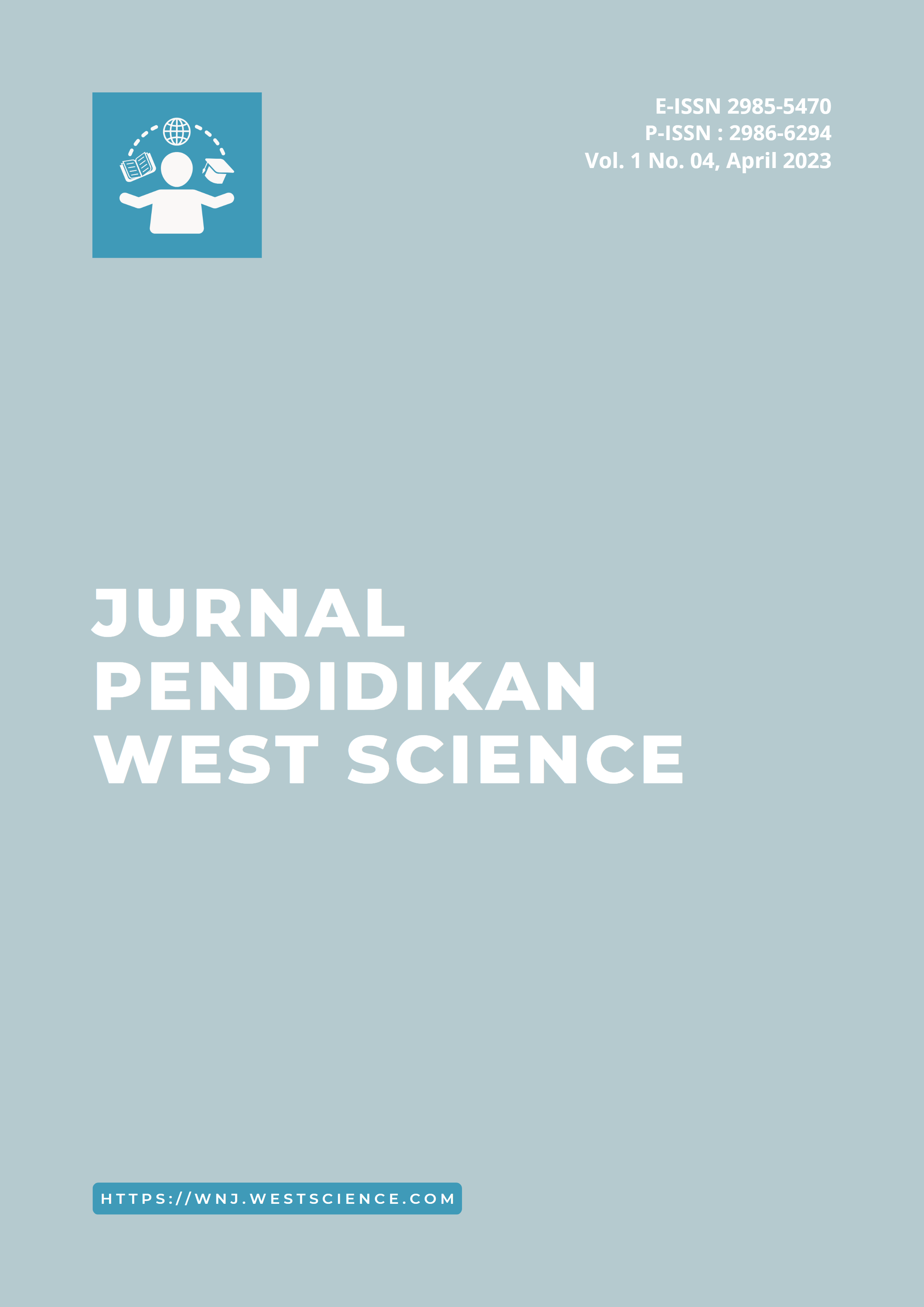Penerapan Pembelajaran Berbasis Proyek di Luar Kelas: Memperkuat Keterlibatan Siswa Melalui Pembelajaran di Komunitas Lokal
DOI:
https://doi.org/10.58812/jpdws.v1i4.462Kata Kunci:
Pembelajaran, Proyek di Luar Kelas, Siswa, Komunitas LokalAbstrak
Studi penelitian ini mengeksplorasi implementasi pembelajaran berbasis proyek (PBL) di luar kelas dan dampaknya terhadap keterlibatan siswa di kelas 5 sekolah dasar di Kabupaten Sukabumi. Penelitian ini menggunakan pendekatan metode campuran, yang menggabungkan survei, wawancara, observasi, dan analisis dokumen untuk mengumpulkan data tentang tingkat keterlibatan siswa, prestasi akademik, sikap terhadap pembelajaran, dan manfaat serta tantangan yang terkait dengan PBL di luar kelas. Analisis data kuantitatif menunjukkan korelasi positif antara tingkat keterlibatan siswa dan prestasi akademik, yang mengindikasikan efektivitas PBL dalam meningkatkan hasil pembelajaran. Analisis data kualitatif mengungkap manfaat PBL di luar kelas, seperti pengembangan keterampilan pemecahan masalah, kerja sama tim, dan kemampuan berpikir kritis. Temuan ini menunjukkan bahwa penerapan PBL di luar kelas memperkuat keterlibatan siswa, mendorong pengalaman belajar yang bermakna, dan menumbuhkan sikap positif terhadap pembelajaran. Studi ini memberikan wawasan berharga bagi para pendidik, pembuat kebijakan, dan pemangku kepentingan di bidang pendidikan dasar, yang menyoroti pentingnya mengintegrasikan PBL di luar kelas untuk meningkatkan keterlibatan siswa dan prestasi akademik.
Referensi
Bessell, A. G., Sinagub, J. M., Lee, O., & Schumm, J. S. (2003). Engaging families with technology: South Florida’s FamilyTech Program increases parental involvement, student success. The Journal, 31(5), 10–13.
Chellapan, L., & van der Meer, J. (2016). Challenges in implementing the flipped classroom model in higher education. In Handbook of research on active learning and the flipped classroom model in the digital age (pp. 352–365). IGI Global.
Chen, P., & Chang, Y. C. (2021). Enhancing Creative Problem Solving in Postgraduate Courses of Education Management Using Project-Based Learning. International Journal of Higher Education, 10(6), 11–21.
Davies, R., & Hamilton, P. (2018). Assessing learning in the early years’ outdoor classroom: examining challenges in practice. Education 3-13, 46(1), 117–129.
Fakhari, M., Vahabi, V., & Fayaz, R. (2021). A study on the factors simultaneously affecting visual comfort in classrooms: A structural equation modeling approach. Energy and Buildings, 249, 111232.
Grace-McCaskey, C. A., D’Anna, L., Hagge, K. S., Etheridge, R., & Smith III, R. L. (2022). Virtually Engineering Community Engagement: Training for Undergraduate Engineers During the COVID-19 Pandemic. Human Organization, 81(3), 217–228.
Halili, S. H., Abdul Razak, R., & Zainuddin, Z. (2014). Enhancing collaborative learning in flipped classroom.
Jones, A., & Zarb, J. (2018). Paradoxically speaking: Community tourism: Discovering Malta and Gozo through its people and culture-diverging or converging sustainability issues? In CAUTHE 2018: Get Smart: Paradoxes and Possibilities in Tourism, Hospitality and Events Education and Research (pp. 46–50). Newcastle Business School, The University of Newcastle Newcastle, NSW.
Karyadi, B., Ruyani, A., & Johan, H. (2018). Impact of outdoor learning by step Introduction, Exploration, and Interpretation (IEI) based on environment on students’ critical thinking. Journal of Physics: Conference Series, 1116(5), 52036.
Lundie, D., Ali, W., Ashton, M., Billingsley, S., Heydari, H., Iqbal, K., McDowell, K., & Thompson, M. (2022). A practitioner action research approach to learning outside the classroom in religious education: developing a dialogical model through reflection by teachers and faith field visitors. British Journal of Religious Education, 44(2), 138–148.
Mann, J., Gray, T., & Truong, S. (2023). Does growth in the outdoors stay in the outdoors? The impact of an extended residential and outdoor learning experience on student motivation, engagement and 21st century capabilities. Frontiers in Psychology, 14.
Mann, J., Gray, T., Truong, S., Brymer, E., Passy, R., Ho, S., Sahlberg, P., Ward, K., Bentsen, P., & Curry, C. (2022). Getting out of the classroom and into nature: a systematic review of nature-specific outdoor learning on school children’s learning and development. Frontiers in Public Health, 1270.
Megayanti, T., Busono, T., & Maknun, J. (2020). Project-based learning efficacy in vocational education: Literature review. IOP Conference Series: Materials Science and Engineering, 830(4), 42075.
Patterson, C. (2015). Challenges faced by educators implementing programs that promote personalized learning.
Rohman, A. A. N., Wilujeng, I., & Kuswanto, H. (2020). The Influence of outdoor learning models on critical thinking ability. Journal of Physics: Conference Series, 1567(3), 32093.
Samsiyah, S., Musadad, A. A., & Pelu, M. (2020). Implementation of Model Project-Based Learning Based on Outdoor Study in Learning to Increase Awareness IPS History. Budapest International Research and Critics in Linguistics and Education (BirLE) Journal, 3(4), 2117–2127.
Sugiyono, F. X. (2017). Neraca pembayaran: Konsep, Metodologi dan penerapan (Vol. 4). Pusat Pendidikan Dan Studi Kebanksentralan (PPSK) Bank Indonesia.
Trisdiono, H., Siswandari, S., Suryani, N., & Joyoatmojo, S. (2019). Development of Multidisiplin Integrated Project-Based Learning Model to Improve Critical Thinking and Cooperation Skills. JPI (Jurnal Pendidikan Indonesia), 8(1), 9–20.
Wang, H., Wang, M., & Li, G. (2022). The use of social media inside and outside the classroom to enhance students’ engagement in EFL contexts. Frontiers in Psychology, 13, 1005313.
Warren, L. L. (2021). The importance of teacher leadership skills in the classroom. Education Journal, 10(1), 8–15.
Wolden, M., & Anderson, B. (2019). Enhancing pediatric education for physical therapy students through the development of community partnerships to facilitate experiential learning: a case report. Journal of Physical Therapy Education, 33(3), 236–242.
Wu, B. (2014). Chinese student migration and integration in the UK: An exploration of links to and engagement with local communities in Nottingham. COMPAS Working Papers, 118.
Yeung, Y. (2022). The Importance of Learning Chinese Outside Classroom (A Study of Good Chinese Learners at The University of Hong Kong). Sino-US English Teaching, 19(5), 179–186.
Zakian, M., Xodabande, I., Valizadeh, M., & Yousefvand, M. (2022). Out-of-the-classroom learning of English vocabulary by EFL learners: investigating the effectiveness of mobile assisted learning with digital flashcards. Asian-Pacific Journal of Second and Foreign Language Education, 7(1), 16.
Zhang, D., & Hwang, G.-J. (2023). Effects of Interaction between Peer Assessment and Problem-Solving Tendencies on Students’ Learning Achievements and Collaboration in Mobile Technology-Supported Project-Based Learning. Journal of Educational Computing Research, 61(1), 208–234.
Unduhan
Diterbitkan
Cara Mengutip
Terbitan
Bagian
Lisensi
Hak Cipta (c) 2023 Salwa Aulia Novitasari

Artikel ini berlisensiCreative Commons Attribution-ShareAlike 4.0 International License.



















 Instagram
Instagram 